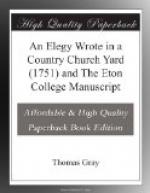o quid solutis est beatius curis, cum mens onus reponit, ac peregrino labore fessi venimus larem ad nostrum desideratoque acquiescimus lecto!
These simple lines convey what Gray’s ploughman is achieving for one evening, but not what the rude forefathers have achieved for eternity. From the ploughman and the simple annals of the poor the poem diverges to reproach the proud and great for their disregard of undistinguished merit, and moves on to praise of the sequestered life, and to an epitaph applicable either to a “poeta ignotus” or to Gray himself. The epitaph with its trembling hope transforms the poem into something like a personal yet universal requiem; and for one villager—perhaps for himself—Gray seems to murmur through the gathering darkness: “et lux perpetua luceat ei.” Although in this epitaph we may seem to be concerned with an individual, we do well to note that the youth to fortune and fame unknown, whose great “bounty” was only a tear, is as completely anonymous as the ploughman or the rude forefathers.
The somber aspects of evening are perhaps more steadily preserved by Gray than by his contemporaries. From Milton to Joseph Warton all poets had made their ploughman unwearied as (to quote Warton):
He jocund whistles thro’ the twilight groves.
With Gray all this blithe whistling stopped together. Evening poems by Dyer, Warton, and Collins had tended to be “pretty,” but here again Gray resisted temptation and regretfully omitted a stanza designed to precede immediately the epitaph:
There scatter’d oft,
the earliest of ye Year
By hands unseen, are Show’rs
of Violets found;
The Red-breast loves to build
& warble there,
And little Footsteps lightly
print the Ground.
With similar critical tact Gray realized that one might have too much of stately moral reflections unmixed with drama. Possibly such an idea determined him in discarding four noble quatrains with which he first designed to end his poem. After line 72 in the manuscript now in Eton College appeared these stanzas:
The thoughtless World to Majesty
may bow
Exalt the brave, & idolize
Success
But more to Innocence their
Safety owe
Than Power & Genius e’er
conspired to bless
And thou, who mindful of the
unhonour’d Dead
Dost in these Notes their
artless Tale relate
By Night & lonely Contemplation
led
To linger in the gloomy Walks
of Fate
Hark how the sacred Calm,
that broods around
Bids ev’ry fierce tumultuous
Passion cease
In still small Accents, whisp’ring
from the Ground
A grateful Earnest of eternal
Peace
No more with Reason & thyself
at Strife
Give anxious Cares & endless
Wishes room
But thro the cool sequester’d
Vale of Life
Pursue the silent Tenour of
thy Doom.




